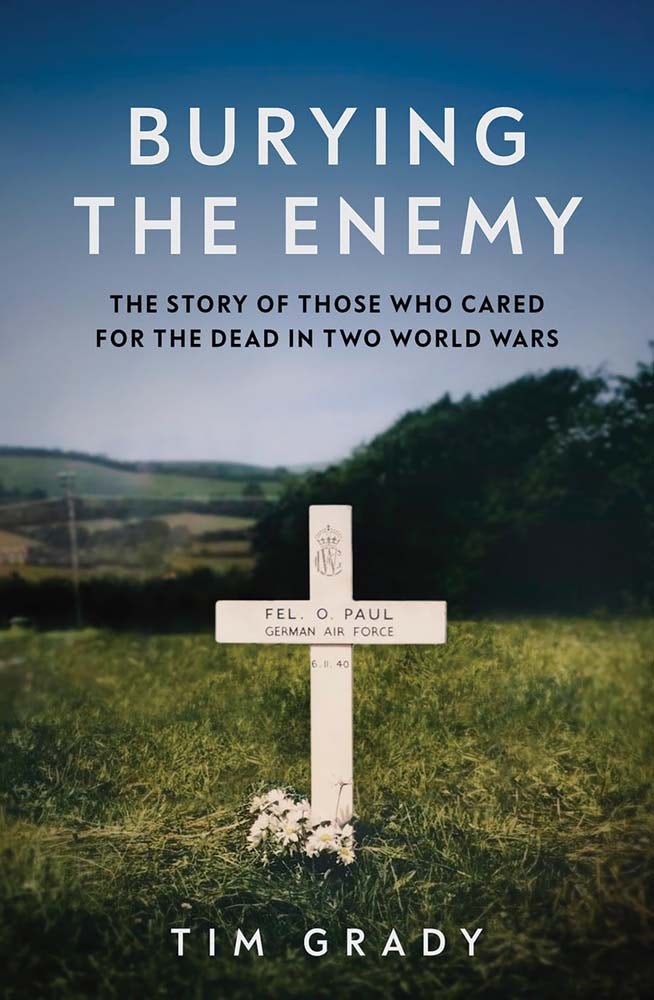New book from Chester Professor places focus on lesser known story of the enemy dead in the two world wars
A hidden, fascinating and moving history of the British and German dead buried on enemy soil in the two world wars and those who tended to their graves is being brought to light by a University of Chester Professor.

Recently published, Burying the Enemy - The Story of Those who Cared for the Dead in Two World Wars by Professor Tim Grady, explores the question of why societies only remember their own national war dead. He shares how, crucially, this was not always the case, but brought about reconciliation and unexpected friendships.
Professor Grady explained: “The enemy dead are largely a blank spot in both Britain and Germany’s ‘collective remembrance’ of the two world wars. With this in mind this book sets out to return the two countries’ wartime foe to the history of 20th-century conflict.”
As the 80th anniversary of VE Day approaches, the book outlines how during both world wars, Germans and Britons died in their thousands not just on distant battlefields, but also on the home fronts. Civilian communities, from Berlin to Bath, London to Leipzig, were left to bury the enemy dead in their closest cemeteries.
Its chapters bring a new focus, discussing how, perhaps surprisingly, local people embraced these graves, often caring for them with considerable tenderness, bonding British and German families together in their shared losses and grief. As part of this, Professor Grady discusses examples of the enemy fallen’s families visiting the resting places, and being welcomed and supported by the local communities.
However, all this ended when the two states moved the enemy bodies to new military cemeteries.
“Local people protested at the disturbance of the dead, and ties between the bereaved families and those who cared for the graves were severed forever. With the enemy out of sight and mind, the British and Germans concentrated solely on commemorating their own war dead, and their own sacrifices,” said Professor Grady.
He added that clearing away signs of the enemy resulted in a more inward looking public memory of the world wars and much simpler narratives of the recent past.
Tim is Professor of Modern History at the University of Chester. He is also the author of A Deadly Legacy, which was shortlisted for the Wolfson History Prize and the Cundill Prize, and The German-Jewish Soldiers of the First World War in History and Memory, which was ‘proxime accessit’ (the runner-up) for the RHS Gladstone Book Prize.
Burying the Enemy, published by Yale University Press, has already received extensive praise.
Matthew Stibbe, author of Debates on the German Revolution Of 1918-19 said: “An important book on a compelling subject, which is vividly brought to life by Grady’s winning prose and wide-ranging research...Turns conventional wisdom about the Anglo-German antagonism on its head.”
Jason Crouthamel, author of The Great War and German Memory, added: “Illuminates an otherwise hidden history...Grady’s sensitive, moving study provides new insights into how ordinary people on the home fronts, long after the shooting has stopped, recover from the devastating effects of modern war.”
Professor Grady is sharing more on the book and its discoveries at a series of events. He has already presented talks at the Institute of Historical Research, London, and the National Army Museum in London. Next he will be speaking at:
- April 2, 2025: The Berwyn Bookshop in Mold - places can be booked via Ticket Source
- April 23, 2025: Cheshire East Libraries, Sandbach – for more details see the Sandbach Library Facebook page
- May 4, 2025: Storyhouse, Chester – further info available at the Land of Mine Storyhouse web page
- June 1, 2025: German Church Liverpool for the Liverpool European Festival
- October 3, 2025: Chester FC - Senior Blues
For more information on the book and to purchase a copy, please visit the Yale University Press website.
